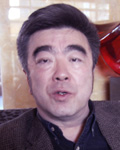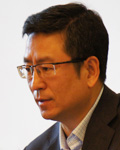|
 |
|
REUNION: Hong Kong residents hoist the flags of China and Hong Kong Special Administrative Region side by side on July 1, 1997, in celebration of the region's return to China (XINHUA) |
For the audio please click here
"Realizing the nation's great renewal is the greatest dream in the modern history of the country," said Xi Jinping, General Secretary of the Communist Party of China (CPC) Central Committee on November 29, 2012.
Xi made the comment while visiting the exhibition The Road Toward Renewal at the National Museum of China with other members of the Standing Committee of the Political Bureau of the 18th CPC Central Committee.
The exhibition illustrates how the country has gained independence and become prosperous and strong in the past century.
"Everybody has one's own ideal and pursuit as well as one's own dream. History tells us that everybody has a future and destiny closely connected to that of the country and nation," Xi said.
Five months later, the 12th National Committee of the Chinese People's Political Consultative Conference (CPPCC), the country's national advisory body, held its first session on March 3-12. Members selected from all walks of life gathered in Beijing, with proposals bearing their interpretations of the Chinese dream.
Renewal of the Chinese nation has been the greatest Chinese dream in modern time since the First Opium War (1839-42). In the latter half of the 19th century, China, then under the rule of backward and corrupt feudal Qing regime (1644-1911), was invaded by Western imperialist powers. Its people lived in misery and the nation was ridiculed as "the sick man of East Asia."
Successive generations of Chinese people with lofty ideals rose up against invading Western powers and feudal rulers in pursuit of their dreams. Although the 1911 Revolution led by Dr. Sun Yat-sen ended more than two millennia of feudalism, nonetheless, the country plunged into another dark period when it was fragmented by bellicose warlords, weakened by rampant corruption and invaded by foreign powers.
Achievements
History took a turn in July 1921, when the CPC was founded. It shouldered the responsibility to change the destiny of the nation and the people, and after 28 years of hard struggle, founded the People's Republic of China on October 1, 1949. China entered a new period along the road to renewal.
Many important decisions on establishing the People's Republic of China were made at the First Session of the CPPCC, which convened in Beijing in September 1949.
At the session, participants adopted the Common Program of the CPPCC, which served as a provisional constitution of the People's Republic of China, and created the Central People's Government.
It selected Beijing as the capital, made the five-star red flag the national flag, chose March of the Volunteers as the national anthem and adopted the Gregorian calendar.
In 1954, the National People's Congress (NPC) was established as the country's formal legislature. That December, the CPPCC passed a charter stating it would no longer serve as a legislature, but instead would be a key mechanism for multi-party cooperation and political consultation under the leadership of the CPC.
The NPC and CPPCC are the two basic platforms through which the Chinese people participate in discussion and management of state affairs.
 |
|
Chen Xiaochuan | "The CPPCC embodies consultative democracy. Although its decisions do not have binding power, it is nonetheless very influential. It is a democratic political system that suits China's cultural background," said Chen Xiaochuan, editor in chief of Beijing-based China Youth Daily and CPPCC National Committee member.
"China's growth, especially its achievements in the past three decades, proves the path we have taken, the system we have adopted and the theories that we have formulated are correct," he said.
 |
|
Bai Yansong | Speaking of the responsibilities of the CPPCC, Bai Yansong, a news anchor and commentator with national broadcaster CCTV and CPPCC National Committee member, said, "CPPCC members should not only put forward proposals, but also speak at seminars and communicate with reporters. They should constantly conduct a large amount of research and think about the development of the country and society. I propose to publicize the performance of deputies to people's congresses and CPPCC members each year in order to put them under public supervision."
In the 63 years since the founding of the People's Republic of China, especially in the more than three decades since the implementation of the reform and opening-up policy, China has continuously made breakthroughs in socialist construction, and Chinese people's dreams have been realized one after another.
In 1964, then Premier Zhou Enlai set forth the goal of "Four Modernizations" to advance development in sectors of industry, agriculture, national defense, and science and technology. In 1979, Chinese leader Deng Xiaoping specified the goal to increase per-capita gross domestic product to $1,000. The country reached that goal in 2003.
In 1997 and 1999, Hong Kong and Macao respectively returned to China, which marked a piece of great progress in upholding the country's sovereignty and territorial integrity.
| 